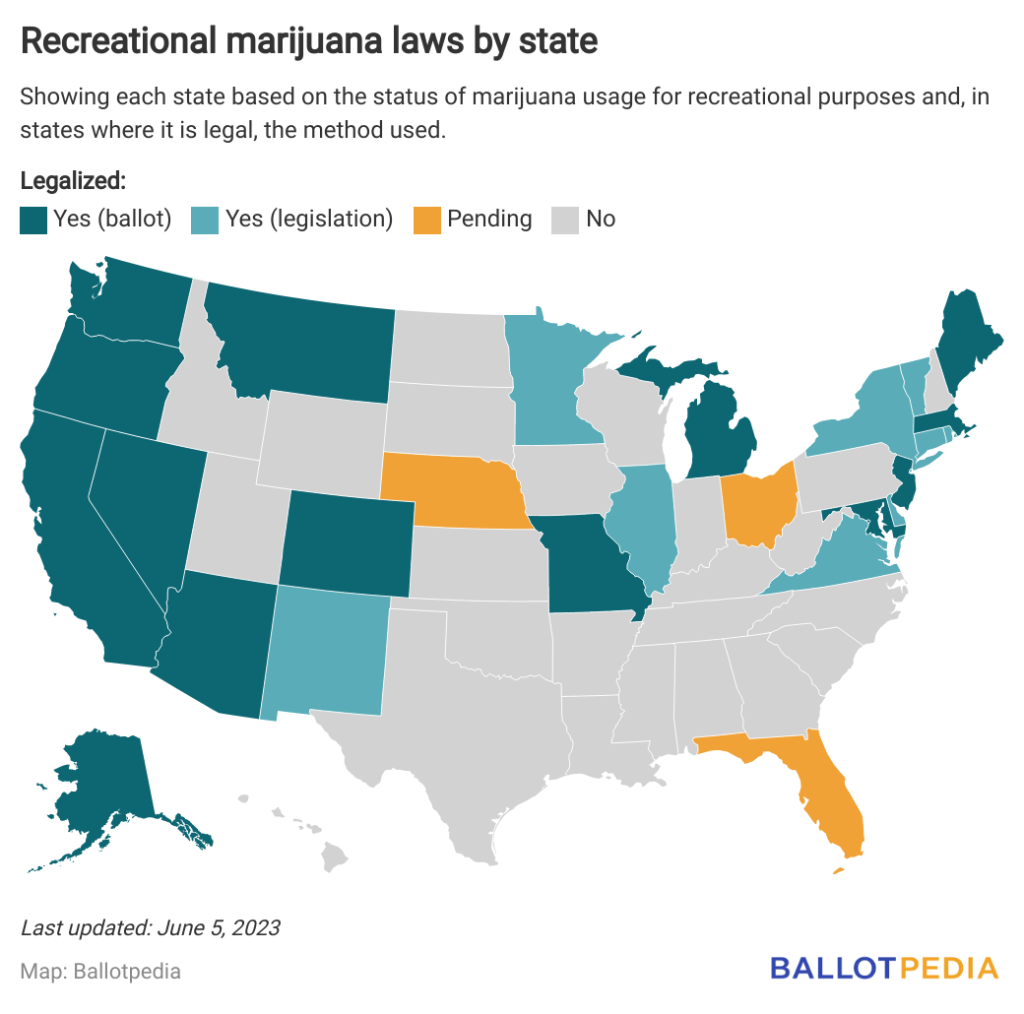On July 5, 2023, signatures were submitted for a marijuana legalization initiative that may appear on the ballot for Ohio voters in November. If the measure appears on the ballot and voters approve it, Ohio will join 23 states that have already legalized marijuana—including 14 of those states and D.C. that have legalized marijuana through the ballot measure process.
The Coalition to Regulate Marijuana Like Alcohol, the campaign supporting the initiative, submitted 222,198 signatures to the secretary of state’s office. If 124,046 signatures are found to be valid, the initiative will appear on the Ohio ballot on Nov. 7, 2023.
This is the second round of signatures submitted for this measure. In order for an indirect initiated state statute to be placed on the ballot in Ohio, two rounds of 124,046 valid signatures are needed. This means that a measure needs a total of 249,092 valid signatures, which also includes the initial round of 1,000 signatures needed to file the proposal.
Currently, 23 states and Washington, D.C., have legalized the possession and personal use of marijuana for recreational purposes (37 states and D.C. have legalized marijuana for medical purposes). In 12 states and D.C., the ballot initiative process was used to legalize marijuana. In two states—Maryland and New Jersey—the legislature referred a measure to the ballot for voter approval.
In nine states, bills to legalize marijuana were enacted into law. Most recently, Delaware and Minnesota legalized the recreational use of marijuana in 2023. The most recent measure on the ballot to legalize recreational marijuana was in Oklahoma on March 7, 2023, and it was defeated with 38% voting ‘yes’ and 61% voting ‘no’.

Of the 30 marijuana legalization measures that have been on the ballot, 15 (50%) were approved and 15 (50%) were defeated. The first state to place a recreational marijuana question on the ballot was California in 1972. It was rejected by voters. The first states to legalize recreational marijuana were Colorado and Washington in 2012, and they did so through the ballot initiative process.
The Ohio initiative, if approved by voters, would legalize the use, possession, cultivation, and sale of recreational marijuana for adults 21 years of age or older. Under the measure, adults would be able to possess up to 2.5 ounces of cannabis and up to 15 grams of marijuana concentrates and be able to grow six marijuana plants at home or up to 12 plants per household. A 10% tax on marijuana sales would also be established, with the revenue going to a “cannabis social equity and jobs program.”
Tom Haren, a spokesperson for the Coalition to Regulate Marijuana Like Alcohol, said, “We are proposing to regulate marijuana for adult use, just like we do for alcohol. Our proposal fixes a broken system while ensuring local control, keeping marijuana out of the hands of children, and benefiting everyone.”
The Coalition to Regulate Marijuana Like Alcohol, according to campaign finance reports covering up to December 31, 2022, reported $1.64 million in cash and in-kind contributions and $1.62 million in expenditures. The largest donor was the Marijuana Policy Project, contributing $925,000.
Ohio Gov. Mike DeWine (R) has previously spoken against the measure to legalize recreational marijuana. He said, “I have seen the negative effects it has had in states that have legalized it and fear that it would also lead to increased use by underage kids and that small children could consume marijuana-laced foods that look like candy.”
Medical marijuana was legalized in Ohio in 2016. Recreational marijuana is illegal in Ohio. Ohio voters previously defeated Issue 3 on the ballot in 2015, which would have legalized the limited sale and use of marijuana and created 10 facilities with exclusive commercial rights to grow marijuana.
If the secretary of state reports enough valid signatures, the measure will go to Ohio voters. Signatures were also filed for an initiative related to reproductive decisions, including abortion, which would also appear on the ballot in Nov. 2023.
Additional reading


